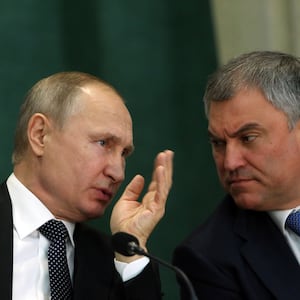While Russian President Vladimir Putin tries to redraw the boundaries of Europe, a pair of lawmakers on Capitol Hill in Washington, D.C., are trying to scrap his playbook before he can take it even further.
Sen. Jeanne Shaheen (D-NH), the chair of the Senate Foreign Relations Subcommittee on Europe and Regional Security Cooperation, and Sen. Mitt Romney (R-UT), who serves on the same committee, are introducing legislation later Tuesday in an attempt to conjure up ways to further box Putin in.
The concerns rumbling through the halls of Congress center on whether the United States has done enough to prepare for and deter Russian aggression in the Black Sea region, so that Putin doesn’t end up feeling empowered to strike out further beyond Ukraine.
“As Putin continues his war in Ukraine, the United States must be prepared to address the challenges he’s created in the immediate and long term for European and U.S. security,” Shaheen told The Daily Beast. “That is precisely what our legislation seeks to do by looking at a critical geopolitical region: the Black Sea.”
Putin has long been interested in leveraging Russia’s access to the Black Sea to course through other sovereign nations and obliterate their borders. Russia invaded Georgia, which borders the sea, in 2008 and annexed Crimea in 2014. Russia has been attacking Ukraine since 2014, re-invading again this year. But Sens. Shaheen and Romney are banking on the idea that if the United States pays more attention to the Black Sea region and makes a concerted effort to shore up security concerns there, the United States might have a shot at stymying Putin’s progress on his imperialistic crusade through Europe.
Focusing on the Black Sea region is necessary to cut Putin off at the source, Shaheen told The Daily Beast.
“Control over access to the Black Sea is fundamental to his delusional dream of building a Russian empire and the United States cannot allow that to happen,” she said.
The legislation from Shaheen and Romney, which is also backed by Sens. Chris Coons (D-DE), Thom Tillis (R-NC), Ben Cardin (D-MD), and Roger Wicker (R-MS), would require the administration to develop an interagency strategy to increase military assistance with NATO and the European Union and increase security assistance to Black Sea countries.
The Biden administration must step up and pump out a strategy before it’s too late to prevent another Russian campaign, Romney told The Daily Beast.
“The Black Sea has become increasingly critical as Vladimir Putin continues to wage his unprovoked war in Ukraine, and it has become clear that the United States must have both a strategy and presence in the region,” Romney said. “Our legislation aims to accomplish this by requiring the Biden administration to develop a strategy to strengthen coordination between the U.S., NATO, and partners in the Black Sea in an effort to increase security, support economic prosperity, and promote democracy.”
Already, world leaders from around the globe have raised concerns that Putin isn’t interested in just going after Ukraine. Ukrainian President Zelensky warned just last month that Putin will not stop with his country.
Putin's allies have hinted themselves at grander scenarios beyond Ukraine in which Putin takes on more far-flung battles to fulfill his imperialistic fantasies. Russia’s lower house speaker warned last week that the United States ought to remember that Russia gave the United States Alaska in the 1800s and that Moscow could seek to take it back. Others have suggested Putin could go head to head with Poland, the United States, or the U.K.
If the United States and allies had stepped up and developed a weightier strategy in the Black Sea region years ago, we might not be facing a Russian war in Ukraine now, according to Ian Brzezinski, the former Deputy Assistant Secretary of Defense for Europe and NATO Policy.
”A more assertive policy is long overdue. The failure of the United States and NATO allies to having a more robust defense of its interests in the Black Sea has actually provoked Russia and prompted Putin to be more aggressive,” Brzezinski told The Daily Beast. “He sees that as a sign of weakness and opportunity to fulfill his revanchist territorial ambitions.”

The pier in Ukraine's Black Sea city of Odessa on Feb. 21.
OLEKSANDR GIMANOV/AFP via Getty Images“We learn from Ukraine alone that the failure of a robust response to aggression just invites further aggression by Putin,” Brzezinski added.
It’s not just about the prospect of future Russian attacks. Putin’s already leveraging the Black Sea to his advantage, holding hostage grain and wheat exports through Ukraine’s Black Sea ports, which could cause famine in Somalia, Kenya, Ethiopia, and beyond, as the International Rescue Committee has warned.
The United States hasn’t had a comprehensive strategy towards the Black Sea region, and Russia’s aggression shows we need to step it up, Bill Taylor, former U.S. Ambassador to Ukraine, told The Daily Beast.
“There's a political strategy that all needs to be put together. We haven't had that in a coherent form, and we need it,” Taylor said.
Russia’s blockade of Ukrainian ports shows just how impactful a better policy in the Black Sea region might be in helping to rein Putin in, Shaheen said.
“We are already seeing the fallout from Putin’s action toward that end by suffocating key ports in Ukraine that have spurred a global food crisis,” Shaheen told The Daily Beast. “His belligerence toward Ukraine today is reaping global consequences, which is why strategic action is crucial to thwart those efforts. “
The proposed legislation would touch on more than just military action. It would require the administration to develop a report on democracy, security, and economic initiatives in the region and new policy options for a more assertive engagement there.
The strategy would include plans to increase NATO capabilities in the region, including land and air forces, and military assistance specifically to Ukraine, Romania, Bulgaria, and Georgia. The strategy would also include schemes to improve coordination with NATO forces, better intelligence operations and systems to track Russian ops in the region, and help defending against hybrid warfare—including plans to support more independent media to counter Russian influence operations.
The National Security Council and other departments would be tasked with providing a plan for speeding up transitions away from legacy Russian military equipment, according to the draft bill text. The legislation would also kick off an assessment of establishing a multinational three-star headquarters on the Black Sea to coordinate all military activities.
It would also require a breakdown of plans on reducing the region’s dependence on energy from Russia, an issue that’s been left unresolved for years and which has been a key flashpoint in the diplomacy surrounding Russia’s invasion of Ukraine in recent months.
The Pentagon is already picking up what Shaheen and Romney are putting down. Gen. Mark Milley, the Chairman of the Joint Chiefs of Staff, said in April the steps the Pentagon is taking in the region now must be focused on two main objectives: “to assure allies and deter any adversary—specifically Russia.”
U.S. Secretary of Defense Lloyd Austin noted while testifying on Capitol Hill in April that Putin’s decision to wage war in Ukraine has forever altered the geopolitics of the region.
“This unlawful and unprovoked aggression by Putin has had the effect of changing the security architecture in the region for some time to come,” Austin said.







